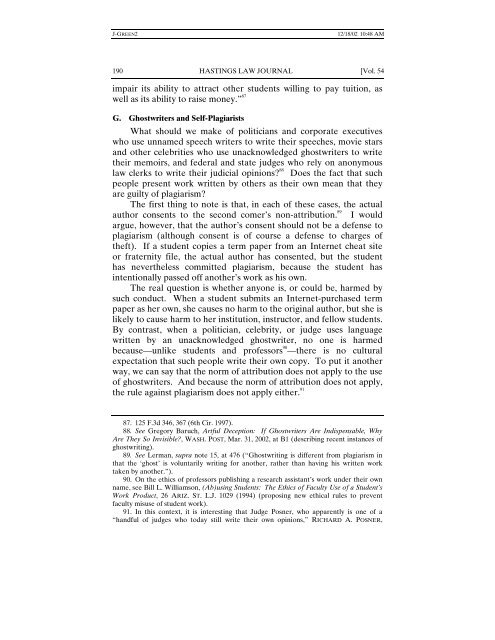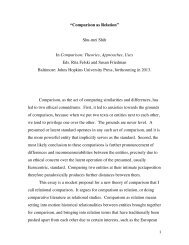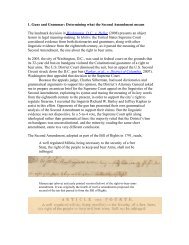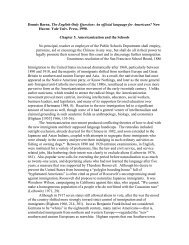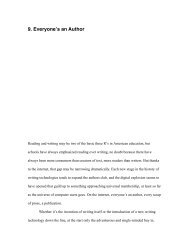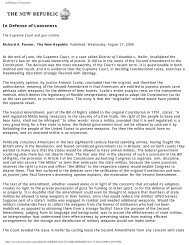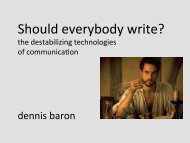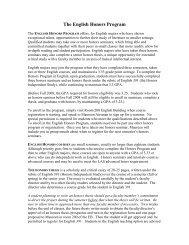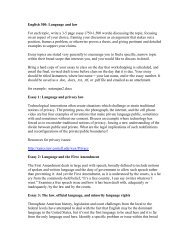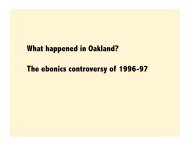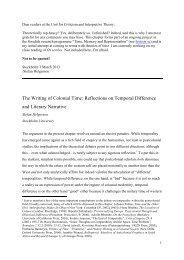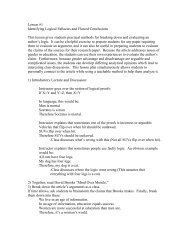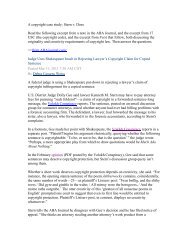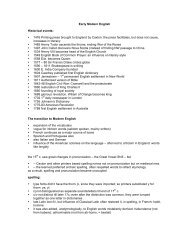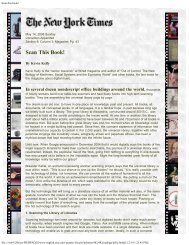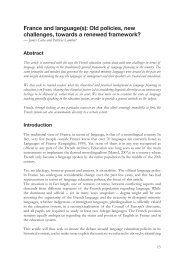Plagiarism, Norms, and the Limits of Theft Law: Some ... - English
Plagiarism, Norms, and the Limits of Theft Law: Some ... - English
Plagiarism, Norms, and the Limits of Theft Law: Some ... - English
Create successful ePaper yourself
Turn your PDF publications into a flip-book with our unique Google optimized e-Paper software.
J-GREEN2 12/18/02 10:48 AM<br />
190 HASTINGS LAW JOURNAL [Vol. 54<br />
impair its ability to attract o<strong>the</strong>r students willing to pay tuition, as<br />
well as its ability to raise money.” 87<br />
G. Ghostwriters <strong>and</strong> Self-Plagiarists<br />
What should we make <strong>of</strong> politicians <strong>and</strong> corporate executives<br />
who use unnamed speech writers to write <strong>the</strong>ir speeches, movie stars<br />
<strong>and</strong> o<strong>the</strong>r celebrities who use unacknowledged ghostwriters to write<br />
<strong>the</strong>ir memoirs, <strong>and</strong> federal <strong>and</strong> state judges who rely on anonymous<br />
law clerks to write <strong>the</strong>ir judicial opinions? 88 Does <strong>the</strong> fact that such<br />
people present work written by o<strong>the</strong>rs as <strong>the</strong>ir own mean that <strong>the</strong>y<br />
are guilty <strong>of</strong> plagiarism?<br />
The first thing to note is that, in each <strong>of</strong> <strong>the</strong>se cases, <strong>the</strong> actual<br />
author consents to <strong>the</strong> second comer’s non-attribution. 89 I would<br />
argue, however, that <strong>the</strong> author’s consent should not be a defense to<br />
plagiarism (although consent is <strong>of</strong> course a defense to charges <strong>of</strong><br />
<strong>the</strong>ft). If a student copies a term paper from an Internet cheat site<br />
or fraternity file, <strong>the</strong> actual author has consented, but <strong>the</strong> student<br />
has never<strong>the</strong>less committed plagiarism, because <strong>the</strong> student has<br />
intentionally passed <strong>of</strong>f ano<strong>the</strong>r’s work as his own.<br />
The real question is whe<strong>the</strong>r anyone is, or could be, harmed by<br />
such conduct. When a student submits an Internet-purchased term<br />
paper as her own, she causes no harm to <strong>the</strong> original author, but she is<br />
likely to cause harm to her institution, instructor, <strong>and</strong> fellow students.<br />
By contrast, when a politician, celebrity, or judge uses language<br />
written by an unacknowledged ghostwriter, no one is harmed<br />
because—unlike students <strong>and</strong> pr<strong>of</strong>essors 90 —<strong>the</strong>re is no cultural<br />
expectation that such people write <strong>the</strong>ir own copy. To put it ano<strong>the</strong>r<br />
way, we can say that <strong>the</strong> norm <strong>of</strong> attribution does not apply to <strong>the</strong> use<br />
<strong>of</strong> ghostwriters. And because <strong>the</strong> norm <strong>of</strong> attribution does not apply,<br />
<strong>the</strong> rule against plagiarism does not apply ei<strong>the</strong>r. 91<br />
87. 125 F.3d 346, 367 (6th Cir. 1997).<br />
88. See Gregory Baruch, Artful Deception: If Ghostwriters Are Indispensable, Why<br />
Are They So Invisible?, WASH. POST, Mar. 31, 2002, at B1 (describing recent instances <strong>of</strong><br />
ghostwriting).<br />
89. See Lerman, supra note 15, at 476 (“Ghostwriting is different from plagiarism in<br />
that <strong>the</strong> ‘ghost’ is voluntarily writing for ano<strong>the</strong>r, ra<strong>the</strong>r than having his written work<br />
taken by ano<strong>the</strong>r.”).<br />
90. On <strong>the</strong> ethics <strong>of</strong> pr<strong>of</strong>essors publishing a research assistant’s work under <strong>the</strong>ir own<br />
name, see Bill L. Williamson, (Ab)using Students: The Ethics <strong>of</strong> Faculty Use <strong>of</strong> a Student’s<br />
Work Product, 26 ARIZ. ST. L.J. 1029 (1994) (proposing new ethical rules to prevent<br />
faculty misuse <strong>of</strong> student work).<br />
91. In this context, it is interesting that Judge Posner, who apparently is one <strong>of</strong> a<br />
“h<strong>and</strong>ful <strong>of</strong> judges who today still write <strong>the</strong>ir own opinions,” RICHARD A. POSNER,


